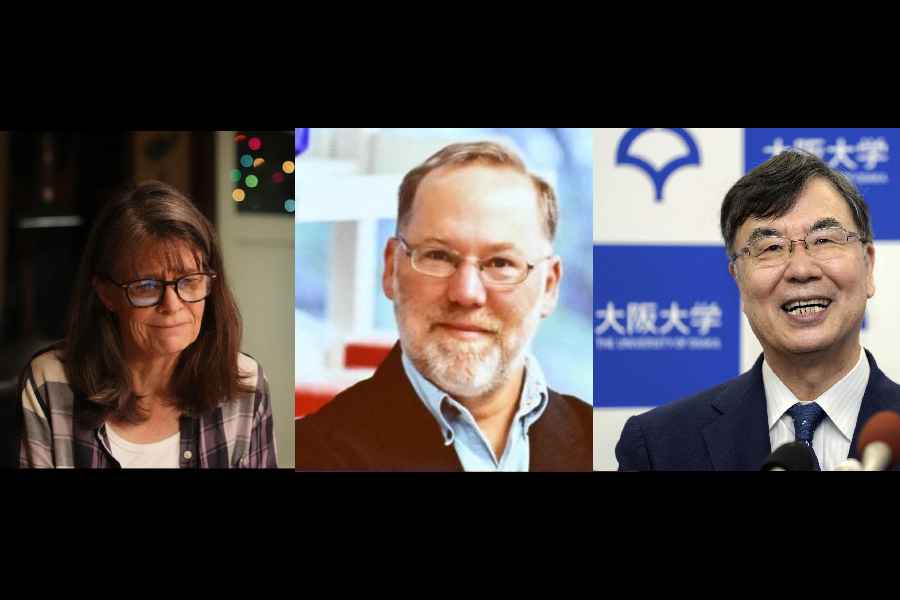Mary E. Brunkow, Fred Ramsdell and Dr Shimon Sakaguchi were awarded the Nobel Prize in Physiology or Medicine on Monday for their discoveries of peripheral immune tolerance — the system that explains how the immune system prevents rogue cells from attacking tissues and organs.
The three researchers will split a prize of around $1.17 million.
Why did they receive the prize?
The committee called their work “fundamental” to understanding how the body’s immune system functions.
Their research spans three decades, and began with Dr Sakaguchi’s experiments with mice in 1995, when he discovered a previously unknown set of immune cells that protected the body against autoimmune diseases.
In 2001, Dr Brunkow and Dr Ramsdell discovered gene mutations that lead to autoimmune diseases, and a dysfunction in T-cell responses. Two years later, Dr Sakaguchi linked their findings to his.
In an interview after the Nobel announcement, Rickard Sandberg, a member of the prize committee, said that the research had provided a “new handle” on how to approach autoimmune disorders, or treatments and organ transplants. There are more than 200 clinical trials ongoing that build on their research, he said.
Who are the laureates?
Dr Shimon Sakaguchi is an expert in immunology at Osaka University, where he is a distinguished professor.
Mary Brunkow researches genomics and autoimmune diseases at the Institute for Systems Biology in Seattle. Fred Ramsdell is a scientific adviser at Sonoma Bio, a biotechnology company based in San Francisco. The two performed the cited work in the Seattle area for Celltech Chiroscience, a British-owned biotechnology company at the time.
Who won the Nobel Prize in Physiology or Medicine in 2024?
Victor Ambros and Gary Ruvkun were recognised for the discovery of microRNA, a tiny class of RNA molecules that play a crucial role in determining how organisms mature and function — and how they sometimes malfunction.
When will the other Nobel Prizes be announced?
The prize for physiology or medicine is the first of six Nobel Prizes that will be awarded this year. Each award recognises groundbreaking contributions by an individual or organisation in a specific field.
The Nobel Prize in Physics will be awarded on Tuesday by the Royal Swedish Academy of Sciences in Stockholm. Last year, John J. Hopfield and Geoffrey E. Hinton shared the prize for work on discoveries that helped computers learn more in the way the human brain does, providing the building blocks for developments in artificial intelligence.
The Nobel Prize in Chemistry will be awarded on Wednesday by the Royal Swedish Academy of Sciences in Stockholm. Last year, the prize went to Demis Hassabis, John Jumper and David Baker for work that showed the
potential of artificial intelligence and other technology to predict the shape of proteins and to invent new ones.
The Nobel Prize in Literature will be awarded on Thursday by the Swedish Academy in Stockholm. Last year, Han Kang, known best for her novel The Vegetarian, became the first writer from South Korea to receive the award.
The Nobel Peace Prize will be awarded on Friday by the Norwegian Nobel Institute in Oslo. Last year, the Japanese organisation Nihon Hidankyo, a grass-roots movement of atomic bomb survivors, received the award “for its efforts to achieve a world free of nuclear weapons”.
Next week, the Nobel Memorial Prize in Economic Sciences will be awarded on Monday by the Royal Swedish Academy of Sciences in Stockholm. Last year, Daron Acemoglu, Simon Johnson and James Robinson were honoured for research into how institutions shape which countries become wealthy and prosperous — and how those structures came to exist in the first place.
New York Times News Service










